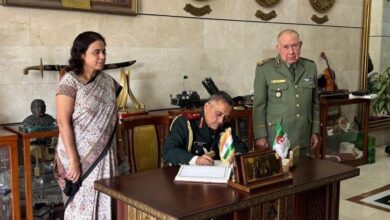India and U.S. Forge Stronger Defense Ties Through Innovation and Industry Collaboration

India and the United States are taking significant steps to bolster their defense partnership, with a focus on fostering innovation and industrial cooperation. Discussions are underway for India’s acquisition of MQ-9B platforms, potentially co-producing land warfare systems, and advancing other co-production initiatives outlined in the India-U.S. Roadmap for Defense Industrial Cooperation.
The second meeting of the India-U.S. Initiative on Critical and Emerging Technology (iCET) concluded on Monday, co-chaired by National Security Advisor Ajit Doval of India and U.S. National Security Advisor Jake Sullivan.
The meeting highlighted significant progress in strategic cooperation across key technology sectors since the iCET’s launch in January 2023. Doval and Sullivan outlined a vision for the next phase of the partnership, focusing on joint efforts in critical areas like space, semiconductors, AI, and clean energy. This will be achieved through co-production, co-development, and joint research & development (R&D).
Doval and Sullivan acknowledged positive progress has been made in negotiations between GE Aerospace and Hindustan Aeronautics Limited (HAL) for the co-production of GE F414-INS6 engines, a key component for India’s future fighter aircraft program. Additionally, the launch of the AI Multi-Doman Situational Awareness product, a joint development by General Atomics and 114ai, exemplifies the expanding industrial partnerships that are fostering advancements in joint all-domain command and control capabilities.
The India-US initiative has made significant progress in various areas, including innovation, space technology, and defense cooperation. The India-US Global Challenges Institute has secured over $90 million in funding from both governments over the next five years to foster partnerships between universities and research institutions in areas like semiconductor technology, sustainable agriculture, clean energy, and pandemic preparedness.
The National Science Foundation and the Indian Department of Science and Technology have awarded nearly $5 million in funding for joint research projects in areas like next-generation telecommunications and machine learning. The “Innovation Handshake” initiative has been launched to address regulatory barriers for startups entering the US and Indian markets, and a trade mission was conducted to deepen STEM partnerships between institutions.
In space technology cooperation, NASA and ISRO are working together on various projects, including a joint effort to send astronauts to the International Space Station. A Strategic Framework for Human Spaceflight Cooperation has been concluded, and a jointly developed satellite, the NASA-ISRO Synthetic Aperture Radar, is set to launch soon.








